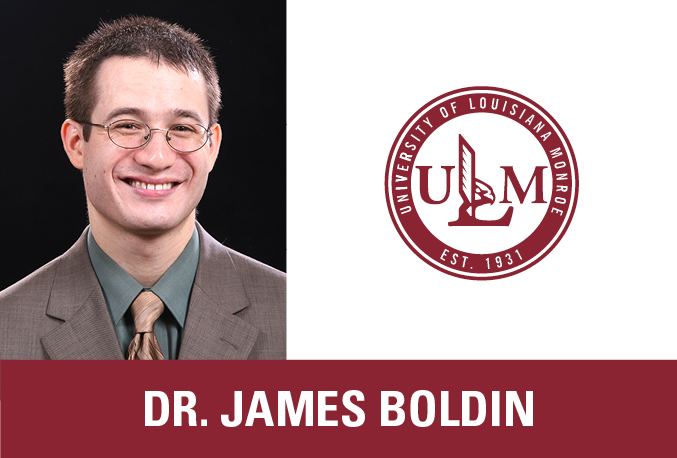
Musicians hear differently because they listen differently. Through years of training, their brains become wired to discern nuances in tone and pitch that most people don’t hear.

It’s that refined hearing which James Boldin, D.M.A., Associate Professor of Music in the School of Visual and Performing Arts at the University of Louisiana Monroe, said has served him well during this semester of strangeness.
Boldin, along with all ULM faculty, made the pivot from in-person instruction to remote learning in mid-March due to the COVID-19 pandemic. Students once playing instruments in front of Boldin in a classroom are now doing so virtually.
“Musicians work for years to develop their critical listening skills to a very high level, and teaching online has required me to use those skills even more than face-to-face lessons,” Boldin said. “Many of the physical cues I would normally pay attention to, and possibly be distracted by, in a private lesson either disappear or are greatly reduced in an online format. That has actually allowed me to step back and focus on really listening closely to the sound that each student is creating on their horn.”
Boldin uses Zoom for virtual meetings for classes and private lessons and ULM’s Moodle system.
“Specifically for music, I have relied heavily on the SmartMusic system, which provides virtual piano accompaniment for many of the solos my students are studying, and Soundtrap, an online tool for making collaborative recordings. Both SmartMusic and Soundtrap generously provided free trials of their software for music teachers and students,” Boldin said.
He’s teaching individual French horn lessons and a studio class for all levels of undergraduates, two music history classes, two music appreciation section, one of which is dual enrollment, and fine arts appreciation.
Over the past few years, Boldin has taught music appreciation and individual French horn lessons online. This experience, combined with resources provided by ULM, helped him make the transition to online. It wasn’t seamless as Boldin sought to safeguard the integrity of the program.
“I wish I could have just snapped my fingers and instantly converted all of my face-to-face classes to online, but the reality is that each course took an individual approach and careful consideration of the learning objectives and material to be covered,” he said. “My primary goal for each course was to preserve the core learning objectives and to ensure that students had the resources they needed to be successful.”
It’s important to Boldin to be approachable for his students, and he believes that’s transferred to his online classes and lessons. But he misses the human connection.
“The interactions I have with students are pretty much the same as they were before the transition to online, although I really miss the little opportunities throughout the day to say hello and check in with students as I pass them in the hall or see them outside on their way to class. It’s easy to take those numerous small interactions for granted under normal circumstances,” Boldin said.
His students have responded well, remaining dedicated and enthusiastic despite the challenges of spring 2020.
“The student response has been very good, considering the unprecedented changes and disruptions that the coronavirus has caused in all of our lives. I am extremely proud of our students for the perseverance and flexibility they have demonstrated,” Boldin said.